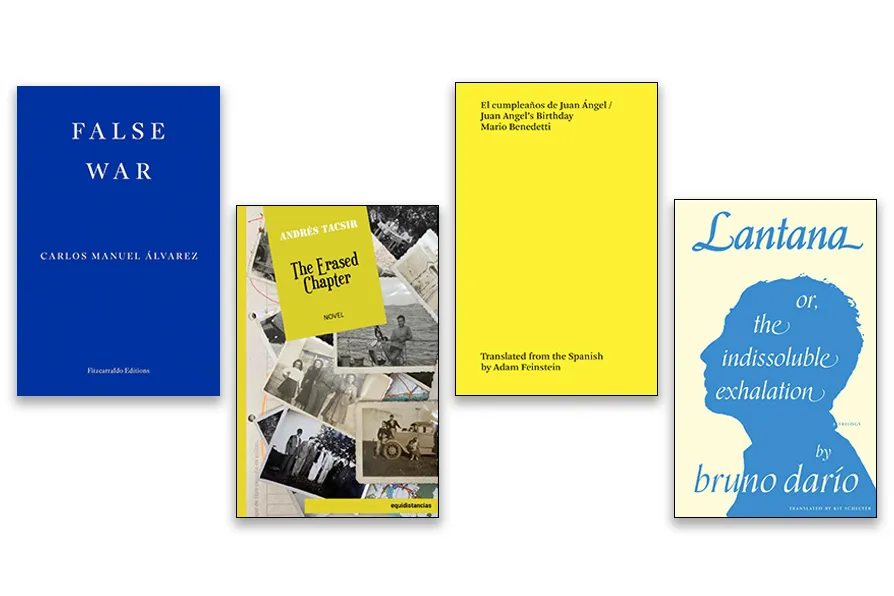SUE TURNER is fascinated by a book that researches who the largely immigrant workforce were that built the Empire State
Novels by Cuban Carlos Manuel Alvarez and Argentinean Andres Tacsir, a political novella in verse by Uruguayan Mario Benedetti, and a trilogy of poetry books by Mexican cult poet Bruno Dario


“THE sound of airplanes cut across the interminable sky of Mexico City. I couldn’t hang around.” And away goes False War (Fitzcarraldo Editions, £14.99), the pacy second novel of Carlos Manuel Alvarez. What follows is a seething race across countries and heads, from Mexico City’s congested streets to Berlin’s ghostly quiet, and on.
With exact translation by Natasha Wimmer, the book is like a collection of migrant tales, inextricably woven together in harmonious echoes — sometimes bound together by character, but often by similar preoccupations with displacement, identity, and desire. Alvarez’s writing is mesmerising — his rhythm propulsive, his vision unflinching.
This is not a novel of abstract exile but the lived experience of dislocation in the 21st century. Perhaps most unforgettable is Fanboy’s Choice, a tender and surreal tale of Latin American lovers lost in the labyrinthine corridors of the Louvre, an embodiment of cultural dislocation taken literally.
Another treasure is Rural Village, in which a man goes back to the village of his birth in the Caribbean after living in Europe, and finds that memory has been colonised by history: “The exile possesses a personal chronology and a particular sensibility, but every personal chronology is small in the face of history.”
Alvarez’s book tells not just of displacement — it does so by shifting shape, voice, and point of view, always keeping the reader moderately off-balance. The outcome is a compelling and necessary book that lingers in the mind long after reading.
No less fascinating, though very different in tone and tempo, is Andres Tacsir’s The Erased Chapter (Equidistancias, £12), imaginatively translated by Beatriz Luna Gijon.
At its core is Ariel Tauber, an Argentine living in London, who takes his French girlfriend Camille on a journey down San Luis and La Rioja, north-west Argentina. A relaxing break turns into a detective novel — one that is interwoven with family secrets, missing records, and the dubious renown of an arguably heroic, arguably villainous uncle.
Tacsir entwines questions of personal identity with the broader tides of Jewish immigration to South America to create a densely layered exploration of truth and legacy. What remains is not the mystery itself, but the mood: rich, cinematic prose evoking Argentine terrain, drawn in hushed intensity that is as political as it is poetic.
Juan Angel’s Birthday (Tenement Press, £18.50) is an extraordinary novel-in-verse by the legendary Mario Benedetti, first released in 1971 and now painstakingly translated by Adam Feinstein.
It’s set in Montevideo and traces the revolutionary discovery of Osvaldo Puente, who becomes the guerrillero Juan Angel. Benedetti’s writing — concise, lyrical, irrepressible — charts ideological and spiritual discovery. Feinstein’s translation preserves the electrifying power of the Spanish original, and his accompanying essay sets the novel’s continuing relevance against the background of political upheaval in 1970s Uruguay. Benedetti reminds us that revolution is not only a historical force but a deeply personal metamorphosis: “I’ve turned hard in this sudden half-shadow/ of the revolution […] the owl and the flamingo are no longer my omens/ nor my jubilation/ but no more than my beloved heirlooms.”
It’s a haunting, masterful work — part Bildungsroman, part political lament, and wholly unmissable.
Lantana or the Indissoluble Exhalation (Ugly Duckling Presse, £17) is the posthumous blaze of Mexican poet Bruno Dario, who died prematurely at 29.
The book — a feast, flight, airsickness, raze triptych — is translated from Spanish by Dario’s friend and author Kit Schluter. It is more than an act of language; it is an act of preservation, akin to resurrection. Dario’s poems are surreal, prismatic and unsettling, written in a sensual language that wraps around itself like smoke. In works like A Hollow in the Moment, he writes:
”Existence accelerates, approaches the face of origin/ … falls in ringlets over itself, repeated/ like a speech or a lullaby/ the mother maliciously intones.”
The result is both enigmatic and enlightening. Dario’s voice, cut off too early, burns with passion, unashamedly redefining Latin American poetics on the brink of life and death. Together, these three books of poetry are not merely literary achievements — they are form-shattering, boundary-crossing investigations of what it means to belong, to remember, and to bear language across seas and centuries. Each creates a different map of exile and is more than worth the journey.










